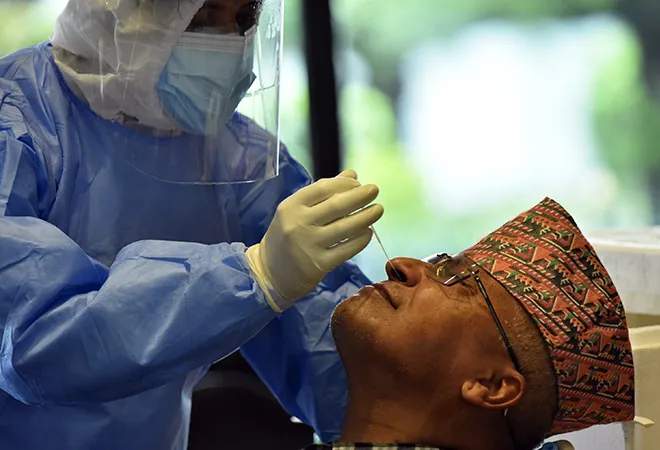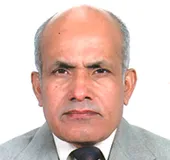
Unfortunately, South Asia seems to have turned into the epicenter of the second wave of COVID-19 as most of the countries in the region, including India, Nepal, Bangladesh and Pakistan have been badly infected by the coronavirus. Instead of being controlled, the situation is getting more flared up as each day passes. Of late, the situation in Nepal is gradually becoming alarming as two out of five people are being tested positive.
There was hardly any impact of the second wave of COVID-19 in Nepal until the first week of March this year. The number of new cases was merely 89 with one death on March 8. Ever since then, the situation has rapidly been turning from bad to worse. With a population of nearly 30 million, infections caused by this pandemic soared up spectacularly to over 9,000. Over 3,500 people in Nepal have breathed their last due to this disease since the pandemic began. In the last three weeks, over 400 people have died.
The second wave of the pandemic has not only affected the Kathmandu Valley but also different cities of the country both in the hills and in the Terai. So much so that even the rural areas are also getting affected. It did not even spare the remotest of the remote areas in the far-off villages. Reports are coming in that the mountaineers who were trekking in the Himalayan region in their bid to climb Mt. Everest have also gotten infected. Over two dozen of the climbers, including foreigners and Sherpa guides, have been tested positive.
Given the seriousness of the situation, the National Human Rights Commission has drawn the attention of all the three tiers of governments in Nepal, including the Federal government, provincial governments and the local governments, to work in collaboration to fight the pandemic.
Most of the affected people are crying for help as oxygen supply, apart from ICU beds and ventilators needed for the treatment of the patients, are acutely lacking. Medicines like Remdesivir and other medical equipment are sold at exorbitant prices.
Hospitals all over the country are unable to accommodate the patients for treatment as there has been a sudden spike in the number of such patients. Several hospitals are even refuging to admit COVID-19 patients.
Cases are abounding in which those infected people who do not have resources are unable to get treatment at the hospitals. There have been several cases in which patients infected by this disease have died of lack of resources to pay for the treatment. Treatment of COVID-19 cases is so costly that it is beyond the reach of the common people to get service in private hospitals as they charge exorbitant rates. Due to the lack of sufficient beds in government hospitals, many patients have no alternative left but to receive treatment in the lobby and yards.
It is not that the government of Nepal has not done anything to face the COVID-19 pandemic. Nepal was one of the first few countries in the world that initiated the inoculation drive as early as January 27 with one million doses of Covisheld vaccine, as made available by India under grant assistance. By that time, the plan was to immunize 72 per cent of the population of the country aged 14 years and above by May.
Initially, Nepal paid the Serum Institute of India to buy 2 million doses of the vaccines. However, Nepal could get the supply of only 1 million of the 2 million doses on February 21. Additionally, the country also received 348,000 doses of Covishield under the World Health Organisation backed COVAX facility on March 7.
But after inoculating nearly 10 per cent of the nation’s 22 million eligible population, the vaccines ran out of stock. As a result, even senior citizens of 65+ years of age, who were given the first dose of the Covishield vaccines, could not get its second dose.
When the crisis erupted, the Nepal government made a plan to procure 5 million doses of Covishield vaccine from the |Serum Institute. But the local Nepal agent of the Serum Institute wanted 10 per cent in commission, which forced the government to step back. Initially, the government had procured the vaccine from the Serum Institute at US $4 per dose, but later its Nepal agent quoted the price of the vaccine as $6.30 per dose.
Expressing his anguish over the delay in the procurement of the vaccines, Hridayesh Tripathi, Minister for Health and Population, stated that the involvement of middlemen in the procurement process complicated the matter for 27 days and it was during that critical period that the second wave of coronavirus spread in the nation. He also added that the Serum Institute could not supply the second consignment of the vaccines to Nepal because during the same period India was also going through a devastating second wave and so its exports were restricted.
Nepal seems to have lost the opportunity of taming the second wave through vaccines because of the involvement of middlemen in the procurement process. However, it is not yet known why action could not be taken against those middlemen who, out of greed, inflated the price of the vaccine by more than 50 per cent from US $4 per dose to US $6.30 per dose. The reputation of the prestigious institution, Serum Institute of India, is also at stake as the middlemen are none but its agents. Indirectly, such uncalled-for activities also erase India’s image in Nepal, which had earned the credibility of providing one million doses of the Covishield vaccine of the Serum Institute to this country in grants.
In this moment of crisis, when people are dying for not getting vaccines, India on its part should see to it that Nepal gets the vaccines without any involvement of middlemen. The Nepal government in this respect also needs to talk to its Indian counterparty directly to enable it to procure the vaccine at least for those senior citizens who have already been given the first dose of Covishield in the country. If India is not in a position to supply 44 million vaccines to inoculate 22 million of its eligible population, it needs to procure the vaccines in the international market for which it might have to pay more. But people’s lives are more important than the cost of the vaccines.
The views expressed above belong to the author(s). ORF research and analyses now available on Telegram! Click here to access our curated content — blogs, longforms and interviews.




 PREV
PREV


